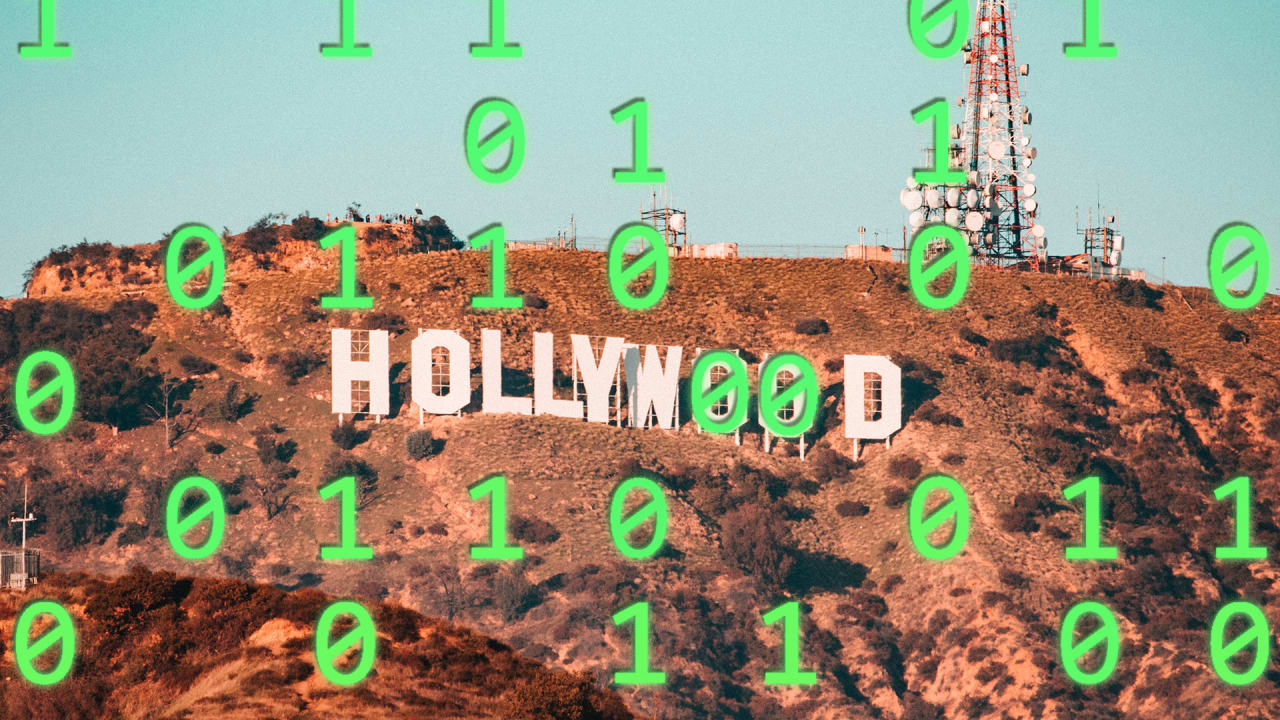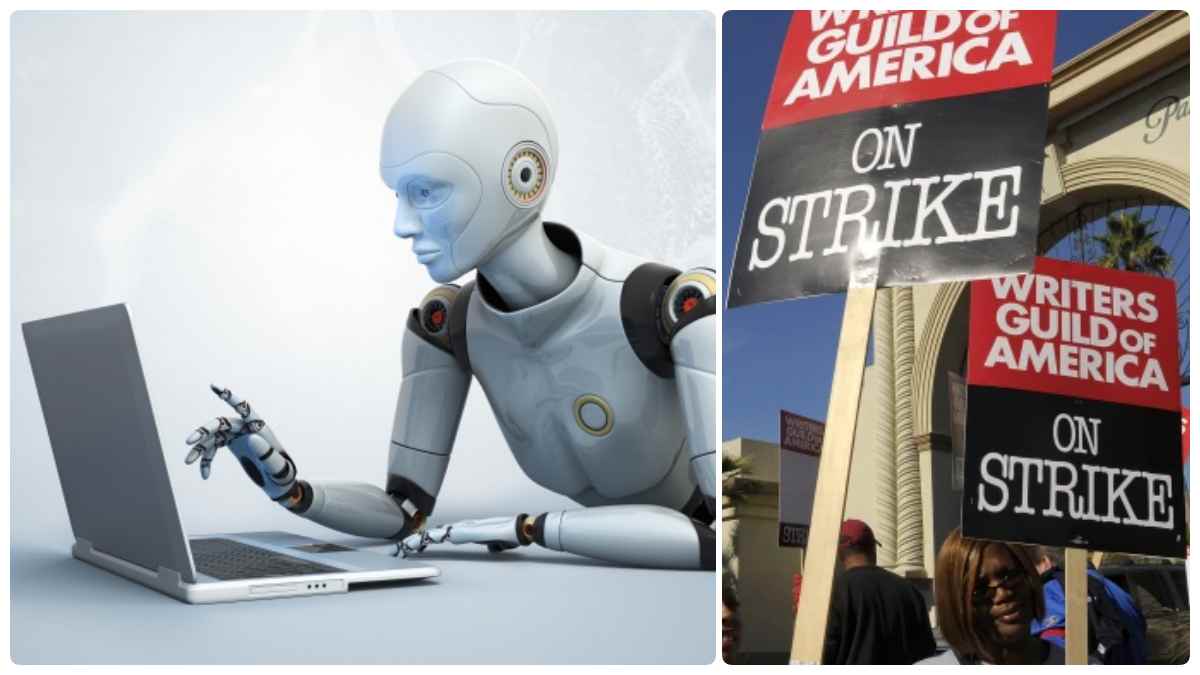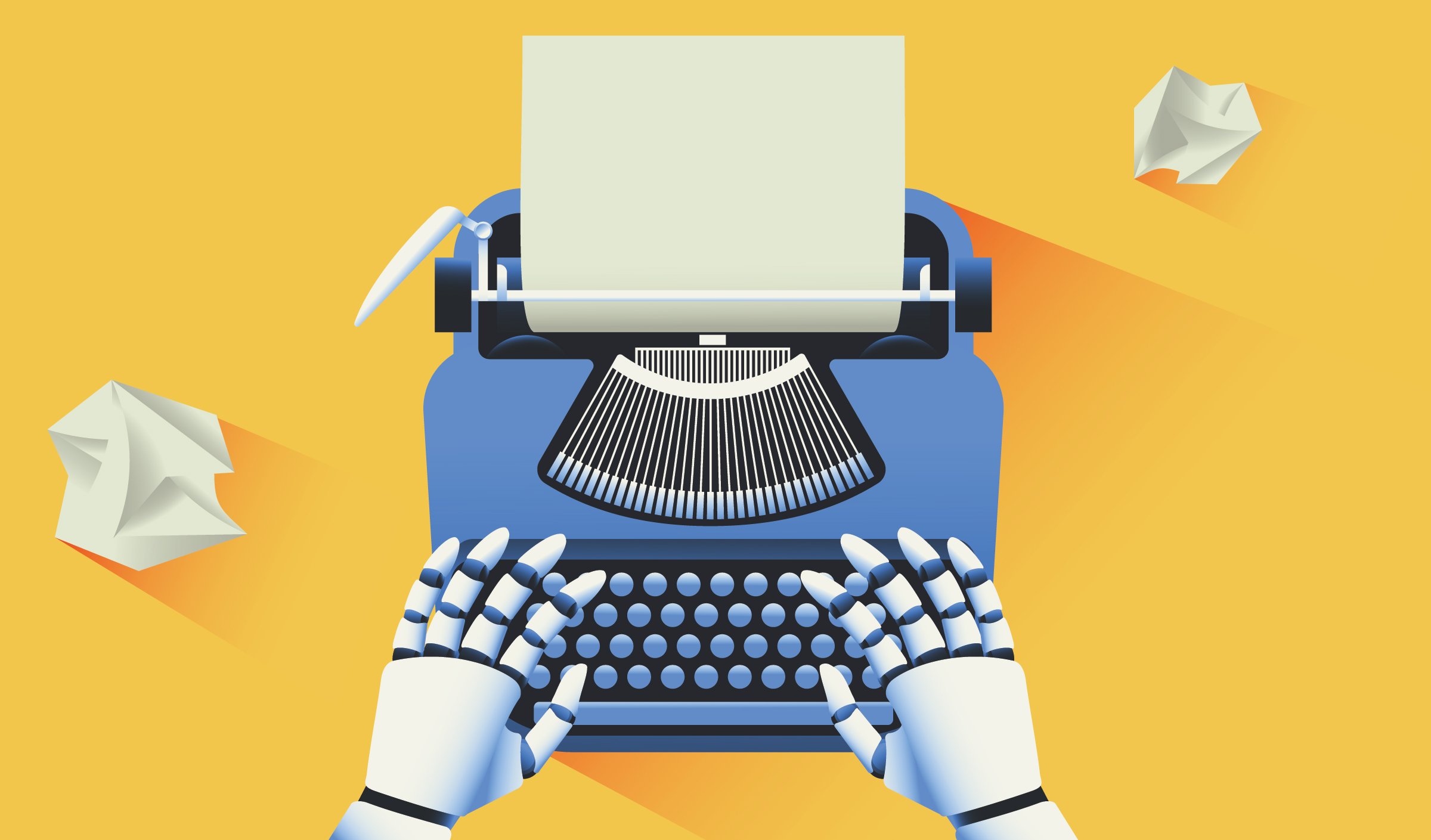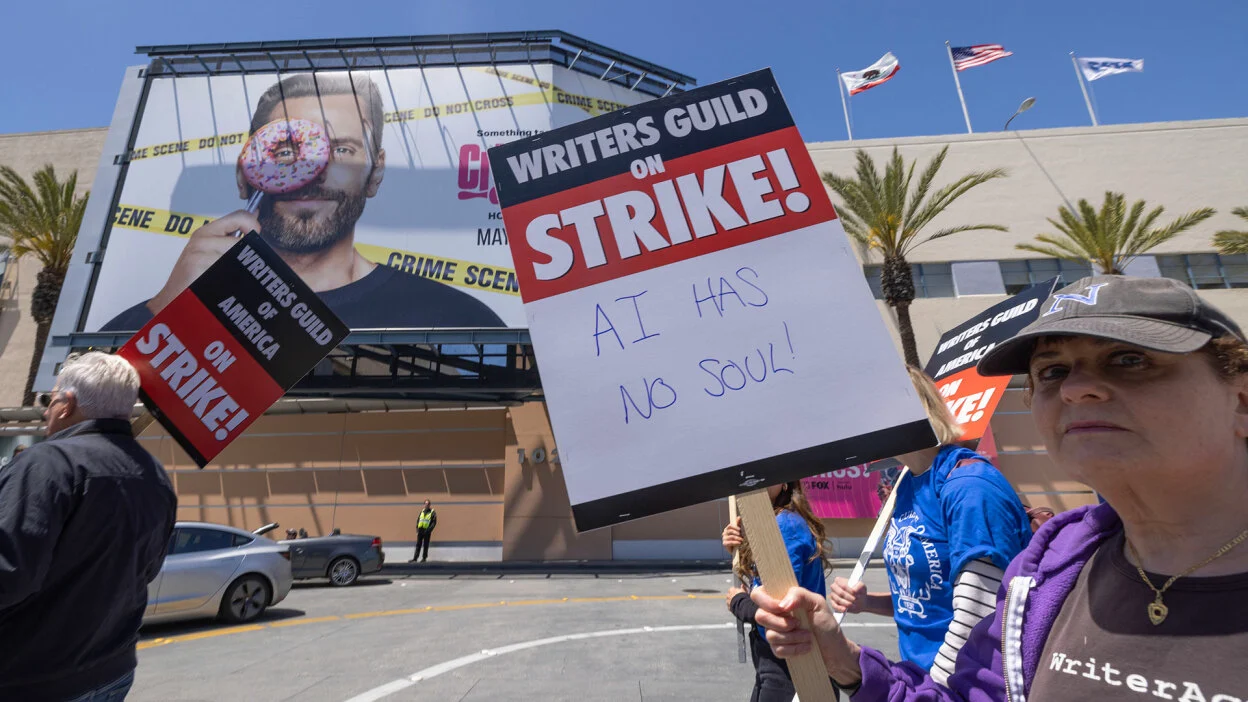
Artificial intelligence (AI) is rapidly transforming the entertainment industry, and Hollywood is no exception. AI is being used in a variety of ways to improve the writing process, from generating ideas to providing feedback on scripts. Some experts believe that AI could even eventually replace human screenwriters altogether. While the idea of AI in Hollywood Writing, may seem like science fiction, it is already a reality.
There are a number of AI-powered screenwriting tools available, and they are being used by some of the biggest names in Hollywood. AI is still in its early stages of development, but it has the potential to revolutionize the way screenplays are written. AI can analyze vast amounts of data to identify patterns and trends, which can then be used to generate new ideas and improve the structure of scripts. AI can also provide feedback on scripts, helping writers to identify areas that need improvement.
Opportunities Of AI In Hollywood Writing
Artificial intelligence (AI) has the potential to revolutionize the world of Hollywood writing, offering a plethora of opportunities to enhance storytelling and filmmaking. Here are some of the key opportunities that AI presents:
- Enhanced Creativity and Idea Generation -AI can serve as a powerful tool for creative exploration, helping writers overcome writer's block, generate fresh ideas, and explore new narrative possibilities. AI-powered tools can analyze vast amounts of data, identify patterns, and suggest unexpected connections, sparking new ideas and perspectives.
- Improved Character Development and Dialogue -AI can assist in crafting compelling characters with depth and nuance. AI algorithms can analyze psychological traits, social dynamics, and conversational patterns to generate realistic and engaging dialogue. AI can also help writers identify and avoid potential stereotypes or biases in character representations.
- Streamlined Scriptwriting and Revision -AI can streamline the scriptwriting process by automating mundane tasks like formatting, research, and fact-checking. AI can also provide feedback on plot structure, pacing, and dialogue, helping writers refine their scripts and identify areas for improvement.
- Adaptation to Different Genres and Styles -AI can adapt its writing style to match different genres, from comedies and dramas to sci-fi and fantasy. AI can analyze the stylistic elements of different genres and generate scripts that adhere to the conventions and expectations of each genre.
- Personalized Storytelling and Audience Engagement -AI can help create personalized storytelling experiences that cater to individual preferences and tastes. AI can analyze audience data, identify trends and patterns, and generate scripts that resonate with specific demographics or target audiences.
- Multilingual Scriptwriting and Translation - AI can break down language barriers, enabling writers to create scripts in multiple languages. AI-powered translation tools can accurately translate scripts while preserving the nuances and cultural references of the original language.
- Accessibility and Inclusion in Storytelling -AI can promote accessibility and inclusion in storytelling by generating scripts that represent diverse perspectives and experiences. AI can analyze cultural contexts and identify potential biases, helping writers create narratives that are sensitive and inclusive.
- Collaboration and Knowledge Sharing -AI can facilitate collaboration among writers, producers, and other creative professionals. AI-powered tools can manage shared workspaces, track revisions, and provide insights from different perspectives, fostering a more collaborative and efficient creative process.
- Data-Driven Storytelling and Audience Insights - AI can help filmmakers gain deeper insights into audience preferences and engagement patterns. AI algorithms can analyze viewing data, identify popular themes and tropes, and suggest storytelling elements that are likely to resonate with audiences.
- AI-Powered Narrative Experiences Beyond Traditional Filmmaking - AI can expand the boundaries of storytelling beyond traditional filmmaking, enabling the creation of interactive narrative experiences, virtual reality (VR) stories, and immersive augmented reality (AR) experiences. AI can generate adaptive storylines that respond to user choices and create personalized experiences.
Challenges Of AI In Hollywood Writing
While AI holds immense potential to transform Hollywood writing, it also presents several challenges that need to be addressed:
1. Preserving Human Creativity and Artistic Control -AI should be seen as a tool to augment human creativity, not replace it. Writers should maintain control over the creative process, ensuring that AI-generated contentaligns with their vision and artistic intentions.
2. Addressing Bias and Discrimination -AI algorithms can inherit biases from the data they are trained on, potentially leading to the perpetuation of stereotypes and discrimination in storytelling. Careful curation of training data and ongoing monitoring of AI-generated content are crucial to mitigate these risks.
3. Ensuring Authenticity and Artistic Integrity -AI-generated scripts may lack the authenticity and nuances of human writing, potentially resulting in formulaic or uninspired storytelling. Writers must carefully review and refine AI-generated content to ensure it meets the artistic and emotional standards of human storytelling.
4. Copyright and Intellectual Property Rights -The use of AI in storytelling raises complex copyright and intellectual property issues. Clear guidelines and legal frameworks are needed to determine ownership, attribution, and compensation for AI-generated content.
5. Job Displacement and Economic Disruption - The adoption of AI in Hollywood writing could lead to job displacement for screenwriters, potentially impacting their livelihoods and contributions to the industry. Strategies for upskilling and reskilling writers are needed to ensure a smooth transition in the face of AI-driven automation.
6. Transparency and Explainability of AI Systems - The decision-making processes and algorithms used by AI writing tools should be transparent and explainable to allow for human oversight and accountability. Writers should understand how AI generates content and be able to identify potential biases or errors.
7. Ethical Guidelines for AI-Powered Storytelling -Ethical guidelines and principles should be established to ensure that AI is used responsibly and ethically in storytelling. These guidelines should address issues of bias, discrimination, privacy, and the potential misuse of AI for harmful purposes.
8. Public Perception and Acceptance of AI-Generated Content -Public perception and acceptance of AI-generated content may influence its adoption and integration into mainstream filmmaking. Writers should engage with the public to address concerns and promote a positive understanding of AI's role in storytelling.
9. Continuous Learning and Adaptation of AI Models -AI models need to continuously learn and adapt to evolving storytelling trends, audience preferences, and technological advancements. Ongoing research and development are essential to ensure that AI remains a valuable tool for Hollywood writers.
10. Finding the Right Balance Between Human and AI Collaboration -The key lies in striking a balance between human creativity and AI's capabilities. AI should complement and enhance human storytelling, not replace it. Writers should embrace AI as a powerful tool to expand their creative horizons while preserving the authenticity and artistic integrity of their craft.
What Movie Was Created Using AI?
While no full-length feature film has been entirely created using AI, there have been several short films produced with significant AI involvement. These films showcase the potential of AI to contribute to various aspects of filmmaking, from scriptwriting and dialogue generation to visual creation and storytelling.
Here are a few notable examples of AI-powered short films:
- "The Frost" (2023) - This 7-minute science fiction short film utilized AI to generate the script, dialogue, and visuals. Directed by Oscar Sharp and produced by New York University's Tisch School of the Arts, "The Frost" explores themes of isolation and survival in a post-apocalyptic world.
- "Last Stand" (2022) -This 4-minute science fiction short film also employed AI for scriptwriting, dialogue, and visual generation. Directed by Anthony Hopkins and produced by the University of Southern California's Institute for Creative Technologies, "Last Stand" depicts a futuristic scenario where humanity faces an existential threat.
- "Glitch" (2021) -This 4-minute animated short film showcases AI's capabilities in visual creation. Directed by Félix Lobrecht and produced by Google AI, "Glitch" presents a visually captivating narrative that blends animation techniques with AI-generated imagery.
- "Check Point" (2021) -This 3-minute thriller short film highlights AI's potential for creating suspenseful and engaging visuals. Directed by Áron Filkey and Joss Fong, and produced by Vox, "Check Point" employs AI-generated imagery to deliver a gripping narrative about surveillance and paranoia.
- "The Safe Zone" (2022) -This 3-minute science fiction short film demonstrates AI's ability to generate a complete narrative, including script, dialogue, and visuals. Directed by Sam Williams and produced by OpenAI, "The Safe Zone" explores the challenges of creating a utopian society amidst technological advancements.
These short films exemplify the growing role of AI in filmmaking, offering glimpses into its potential to enhance storytelling, expand creative possibilities, and revolutionize the filmmaking process. As AI technology continues to evolve, its impact on the film industry is likely to become even more significant, shaping the future of cinema and narrative creation. See Also: Can AI Replace Writers?
Hollywood Writer's View Of AI
Hollywood writers have mixed views on the potential impact of artificial intelligence (AI) on their craft. Some writers are excited about the potential of AI to help them brainstorm ideas, generate scripts, and provide feedback, while others are concerned about the potential for AI to replace human screenwriters altogether.
Optimistic Views
- AI can help writers overcome writer's block and generate fresh ideas -AI can analyze vast amounts of data and identify patterns and connections that humans might miss. This can help writers come up with new and original ideas for stories.
- AI can help writers develop more complex and nuanced characters - AI can analyze psychological traits, social dynamics, and conversational patterns to create characters that are more realistic and engaging.
- AI can help writers improve their writing style - AI can analyze the writing styles of successful screenwriters and suggest ways for writers to improve their own writing.
- AI can help writers streamline the scriptwriting process - AI can automate mundane tasks such as formatting, research, and fact-checking. This can free up writers' time to focus on the creative aspects of writing.
Concerns
- AI could lead to the loss of jobs for human screenwriters -If AI becomes sophisticated enough to write scripts on its own, there will be less need for human screenwriters.
- AI could produce formulaic or uninspired scripts -AI algorithms may not be able to capture the nuances and subtleties of human creativity. This could lead to scripts that are predictable and lacking in originality.
- AI could be used to create biased or discriminatory content -AI algorithms can inherit biases from the data they are trained on. This could lead to the creation of scripts that perpetuate stereotypes or promote discrimination.
- AI could lead to a loss of control for writers - If AI is used to write scripts, writers may have less control over the creative process.
Hollywood writers are cautiously optimistic about the potential of AI. They recognize that AI has the potential to be a powerful tool for storytelling, but they also have concerns about the potential negative impacts of AI on their profession.
Ai In Hollywood Writing - FAQ's
Is There An AI That Can Write A Movie Script?
Shortly, AI is another excellent AI script generator for writing stories, novels, and compelling video scripts. It uses the most advanced Open. AI GPT-3 AI algorithms to create human-like content (and GPT-4 is coming).
Will AI Replace Hollywood?
There's a general consensus that AI can't produce original TV shows and movies that are anything close to what audiences expect, and that it may never be a satisfying substitute for the real human deal. “It's fun to imagine a generative AI scriptwriter, but there is absolutely no interest in that.
Is Netflix Using AI?
How does Netflix use AI and ML? As users browse through the company's thousands of movies, Netflix employs AI and ML to determine which visuals are most likely to captivate each viewer. In the year 2022, it is one of the greatest ways that Netflix efficiently uses artificial intelligence.
Is AI A Threat To Writers?
For many book writers, artificial intelligence (AI) is a threat to their jobs and the very idea of creativity. More than 10,000 writers and others supported an open letter about the issue from the Authors Guild this summer. The letter urged AI companies not to use copyrighted work without permission or payment.
Conclusion
As AI continues to evolve and permeate various aspects of our lives, its impact on Hollywood writing is becoming increasingly evident. While AI has the potential to revolutionize the filmmaking process, offering a plethora of opportunities to enhance storytelling and creativity, it also presents several challenges that need to be addressed carefully.
On one hand, AI can serve as a powerful tool for writers, assisting them in overcoming writer's block, generating fresh ideas, and providing feedback on their work. AI algorithms can analyze vast amounts of data, identify patterns, and suggest unexpected connections, sparking new ideas and perspectives that might have been overlooked by human writers. Additionally, AI can help refine scripts by analyzing plot structure, pacing, and dialogue to ensure that the story flows smoothly and resonates with the audience.


